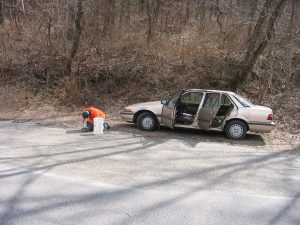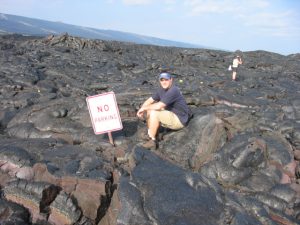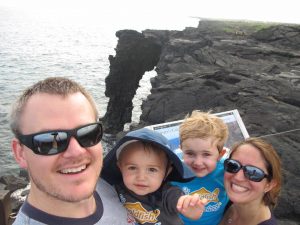Derek Pizarro 2004
I have always had an interest in physical science. At Lafayette, I started in engineering, as I liked design, but I also knew all my credits would transfer if I changed my mind. Two years in, I wanted to make that change. I saw consultants expanding the use of geologists for site investigation and remediation, to better characterize site data and geologic interpretation. The timing was appropriate; the remediation industry was embracing enhanced data collection and modeling, and the LC geology department was taking the plunge concomitantly. It was a smart move; everything I learned three years in Van Wickle, while rooted in traditional geology, was with an air of technology. Things considered new my senior year have become requisite in our field.
Lafayette, I started in engineering, as I liked design, but I also knew all my credits would transfer if I changed my mind. Two years in, I wanted to make that change. I saw consultants expanding the use of geologists for site investigation and remediation, to better characterize site data and geologic interpretation. The timing was appropriate; the remediation industry was embracing enhanced data collection and modeling, and the LC geology department was taking the plunge concomitantly. It was a smart move; everything I learned three years in Van Wickle, while rooted in traditional geology, was with an air of technology. Things considered new my senior year have become requisite in our field.
While at Lafayette, I was a four-year letter winner for Swimming & Diving Team, the water polo team captain, and a member of the geology and history clubs. All of these experiences were important to my development. These extracurricular activities provided a critical balance to my academic pursuits, despite their demand on time. From an academic perspective, the interim geology trip to Hawaii to study geologic evolution of the Hawaiian Islands, had a transformative impact on me. I became obsessed with volcanism and physical geology. Hawaii instilled a global travel bug I did not really have prior to then. My wife and I have been to the islands a number of times since we met in 2004, and now we take our two sons with us. Naturally, I am instilling in them an appreciation for the geology of the islands in addition to our recreational activities.
 Immediately after graduation I assumed a position as an Environmental Scientist with Earth Data NE (Exton, PA), which is a field services firm. Environmental field services firms provide specialized expertise, persons and/or equipment, to consultants and site owners for site investigation, remediation, or closure. With Earth Data, I conducted geophysical bore logging and packer testing for fractured bedrock. After resolving some student loans, and debating returning for a Master of Science degree in Geophysics, I accepted a job offer with O’Brien & Gere (Wash. DC), an engineering and environmental consulting firm. I was immediately deployed to site investigation teams on sites ranging from Florida to New Jersey utilizing geophysics and advanced site and contaminant data collection technology and manipulation.
Immediately after graduation I assumed a position as an Environmental Scientist with Earth Data NE (Exton, PA), which is a field services firm. Environmental field services firms provide specialized expertise, persons and/or equipment, to consultants and site owners for site investigation, remediation, or closure. With Earth Data, I conducted geophysical bore logging and packer testing for fractured bedrock. After resolving some student loans, and debating returning for a Master of Science degree in Geophysics, I accepted a job offer with O’Brien & Gere (Wash. DC), an engineering and environmental consulting firm. I was immediately deployed to site investigation teams on sites ranging from Florida to New Jersey utilizing geophysics and advanced site and contaminant data collection technology and manipulation.
I was introduced to a contact at my current employer, Premier Magnesia (http://www.premiermagnesia.com) (King of Prussia, PA), a private mining and chemical manufacturing company during a Lafayette networking reception at Williams Center in 2008. Shortly after, the remedial manager position search commenced, and I was contacted about applying for it. While the job involves a lot of the characteristics of experiences and expertise as a project geologist, it required additional skills in sales and regulatory compliance. It was a significant change, but enticing to focus on an industry segment I enjoyed the most, soil remediation. I currently manage an environmental products portfolio for Premier Magnesia. We assist industrial businesses, waste management companies, site owners, consultants, and environmental contractors with remediation of inorganic and organic contaminants, namely heavy metals and petroleum range compounds. Our team consists of geologists, geochemists, chemists, engineers, technical support staff, and salespersons.
From a career perspective, one of the most important skills I learned at Lafayette was GIS. It has become the modeling and display interface, and repository for site data. CAD is required for construction design, but GIS and integrated modeling programs, e.g. ModFlow, RockWorks, etc. have become requisite tools and knowledge base. I believe 3D GIS modeling will shortly supplant CAD use in the field due to geolocation abilities, as data can be manipulated, viewed, and presented on a tablet. I also feel a little computer programming alongside these computer and data collection programs would be useful.
If you are interested in pursuing a career in environmental remediation, try an internship or externship; even within a couple of weeks you will see many facets of the industry and understand how different scientific disciplines are utilized on site remedy teams. One of these experiences would expand your geology borders and broaden your knowledge base. Plus, you will see how contaminants affect and interact with soil, water, and rock, which to date you have likely only studied based on a contaminant-free environment.
Internships are best made through a warm connection via alumni or other networks- do them real-time. Resume/CV uploading and mailing to employers are still part of the equation, but are not nearly as productive or catalyzing. I recommend keeping your resume, or at a minimum your contact information, readily accessible on your phone to be able to supply it to new contacts real time. There are even apps for ease of networking for example near-field communication (NFC) transfer of business cards, resumes, etc. where no paper or email is even necessary to connect.
I would also recommend joining, and networking on LinkedIn (https://www.linkedin.com/in/derekpizarro) and within the Lafayette network. The most powerful connections are not typically the ones you already have, but those from which you are one degree of separation away. Take advantage of all the resources and experiences available to you, both at Lafayette and your employer, but especially at Lafayette. A number of classmates have said after graduation, “I wish I had gone to that talk, took that interim trip, or tried another intro class.” Even the most distant experiences from your field of study rub off and contribute pieces to your career path and analytical mind. Start a journal or blog, even if only on one topic, even if no one ever sees it, and even if you only write a few sentences or paragraphs per day/event. A brain dump daily or weekly can really help organize your thoughts and cement experiences and knowledge in your brain. It is also a useful business tool, to analyze what you could have done better with a project or client. I wish I had started writing about my day or experiences sooner; even today I wish I would collect more of my thoughts. 
Finally, I recommend being open to career change. Even if you studied a particular area of science or arts, you should never consider yourself confined to a singular field or career. Most employers value workers from diverse backgrounds who can offer transferable skills and a relentlessly positive attitude.